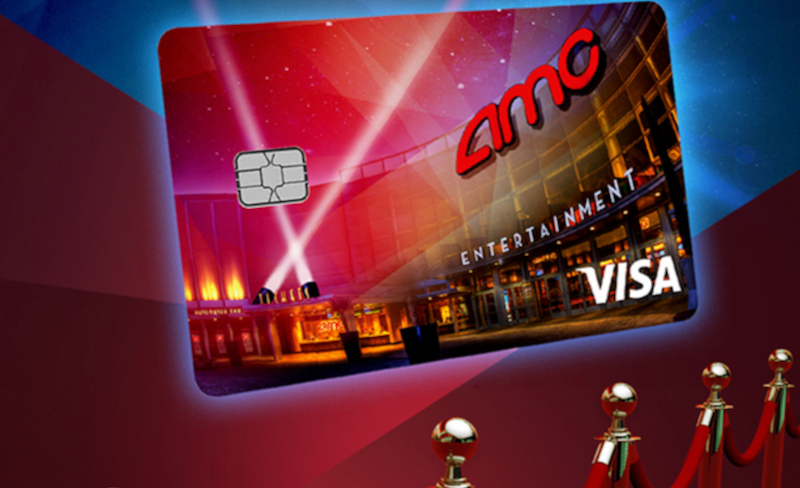
In bankruptcies of airlines and other consumer-facing companies, sometimes their most valuable asset are their sideline credit card businesses. After some false starts in past years, exhibition is coming to recognize the value of leveraging such consumer financial relationships to build durable collateral businesses. AMC Entertainment announced its own Visa credit card this week.
AMC will market the financial product sometime in 2023 at which time it says that it will have the only movie-theater credit card in the United States. The theater circuit’s partners are financial services giant Visa and Deserve, a credit card technology platform.
Using the card in AMC theaters earns rewards in the AMC Stubs loyalty program. At the start of the year, AMC accounted for 19% of U.S. boxoffice from 593 theatres and 7,755 screens (or about 19% of total U.S. screens).
Credit cards are a natural diversification given exhibitors are hungry for more consumer data in the digital age to pinpoint marketing to moviegoers located in their geographies. Theaters, however, are limited in freebies because every patron watching a movie triggers a cost typically of $5 or more per head that contractually must be paid to film distributors.
On the other hand, airlines that can give away unfilled seats on flights at little additional cost and hotel chains can provide rooms that otherwise would be vacant.
There’s value in having a viable consumer finance business. When General Motors (Chevrolet, Cadillac and other car brands) filed for a prepackaged bankruptcy in 2009, its in-house car finance arm was one of its most valuable assets helping it successfully reorganize.

Theater circuits have long offered consumer goodies with financial characteristics in the form of gift cards and loyalty programs. For example, the loyalty program from third-largest U.S. exhibitor Cinemark hit 1 million participants in June charging $9.99 a month for one ticket monthly plus other benefits.
The largest theater chain in Canada, Cineplex, also corralled 1 million members for its loyalty program dubbed Scene, which has a Visa credit card attached. Elsewhere, Hollywood distributors have their own versions of loyalty programs such as Disney’s sprawling D23 Official Fan Club (the studio was founded in 1923) and Warner Bros. DC Fandome, which is tied to its DC Comics franchise.
AMC’s Stubs loyalty program offers three tiers, of which one is free and thus not a financial product. “As of December 31, 2021, we had more than 25,300,000 member households enrolled in AMC Stubs A-List, AMCStubs Premiere and AMC Stubs Insider programs on a combined basis,” AMC said in its 10K disclosure for 2021. “Our AMC Stubs members represented approximately 40% of AMC’s U.S. market attendance. Our large database of identified movie-goers also provides us with additional insight into our customers’ movie preferences. This enables us to have a larger, more personalized and targeted marketing effort.”
The new AMC-Visa venture isn’t a first. Movie-branded credit cards have popped up but really haven’t taken hold. Back in 2004, Universal Pictures launched a branded MasterCard with Chase bank, which fizzled.
In a forgotten footnote of cinema history, the next year theater chain Regal Cinema talked up a branded Mastercard in 2005 that didn’t catch on. And more recently, Regal’s UK-based parent CineWorld filed for bankruptcy in September after a mega-merger deal fell through.

Getting more traction, Walt Disney Co. launched the Disney Visa Credit Card with Chase bank in 2015 that initially used “Star Wars” images for additional branding. Disney owns the Star Wars franchise, and the Disney name has an appeal with its family content and theme parks.
Lists of active customers are extremely valuable these days because digital media enables direct contact at low costs; for example, blasting emails is an inexpensive marketing vehicle. Granular consumer data — location, age and personal interests — is used to tailor messaging, particularly in digital media. Such data directly-collected became more valuable when federal regulators began cracked down on use of third-party mailing lists in the past year.
For theater circuits, diversification carries risks. AMC invested in metals buying a stake in Hycroft Mining, whose share price then tanked. On the horizon, AMC is also preparing to launch its own branded popcorn, entering the highly competitive food sector that requires a physical product.
But the AMC credit card venture will likely hinge on the circuit’s marketing, since credit is a pure service without physical goods. AMC attached a sweepstakes to its Visa card to stoke consumer interest. Another inducement is “new cardholders who spend at least $50 during the first three months will enjoy an extra $50 in AMC Stubs Bonus Bucks to spend on their next trip to the movies, within 90 days of receiving the reward,” says an AMC press release. “To celebrate the launch of the AMC Entertainment Visa Card, new cardholders who spend at least $50 during the first three months will enjoy an extra $50 in AMC Stubs Bonus Bucks to spend on their next trip to the movies, within 90 days of receiving the reward.”
AMC Chairman and CEO Adam Aron, says in the press release: “Until now, the theatrical exhibition industry is one of the few untapped major retail sectors that hasn’t offered consumers the opportunity to amplify their purchase power, accelerate their rewards, and demonstrate their loyalty through the use of a co-branded credit card. With a built-in customer base of tens of millions of existing AMC Stubs members, we know there are avid moviegoers who will benefit greatly from using their AMC Entertainment Visa Card at the movies and for their everyday purchases.”
AMC’s fintech partner Deserve is putting consumer credit on mobile and in the cloud. Through Deserve, AMC offers rewards, 24/7 customer service and fraud protection, said Kalpesh Kapadia, co-founder and CEO of Deserve, in the press release.
Related content:
Leave a Reply